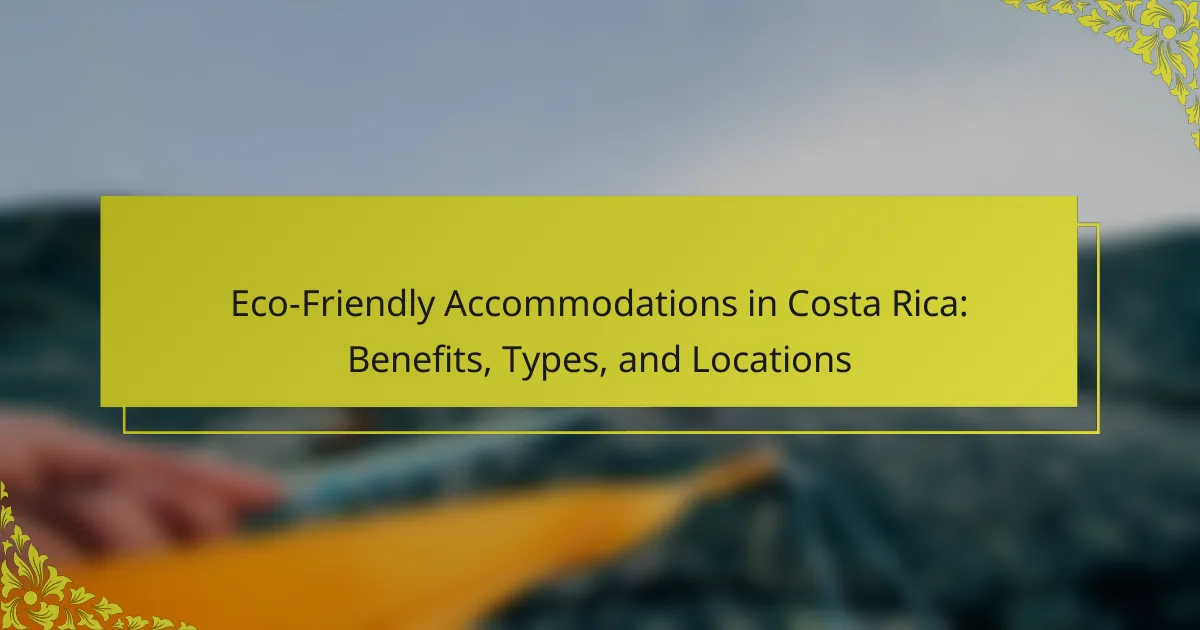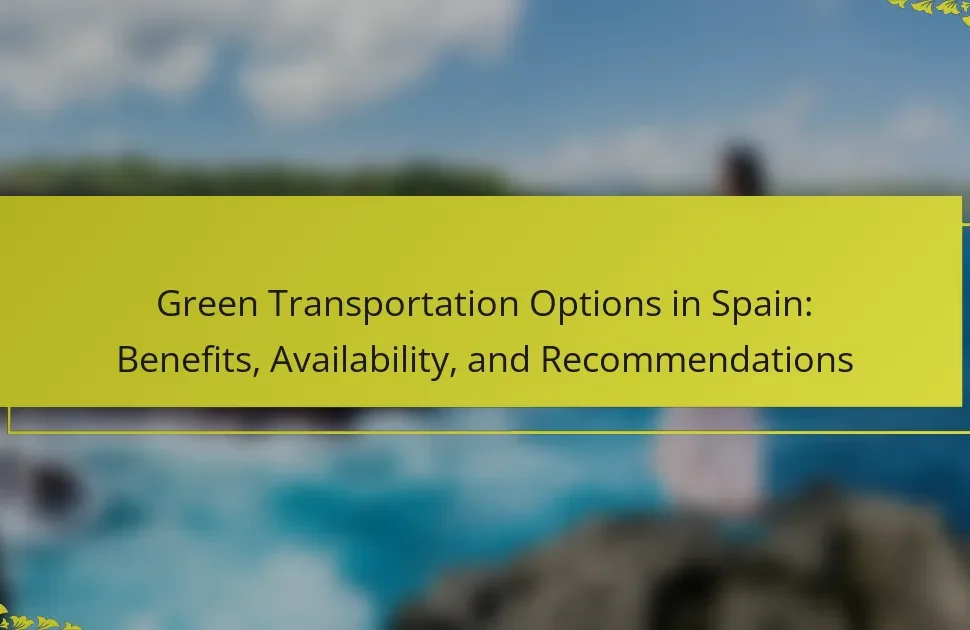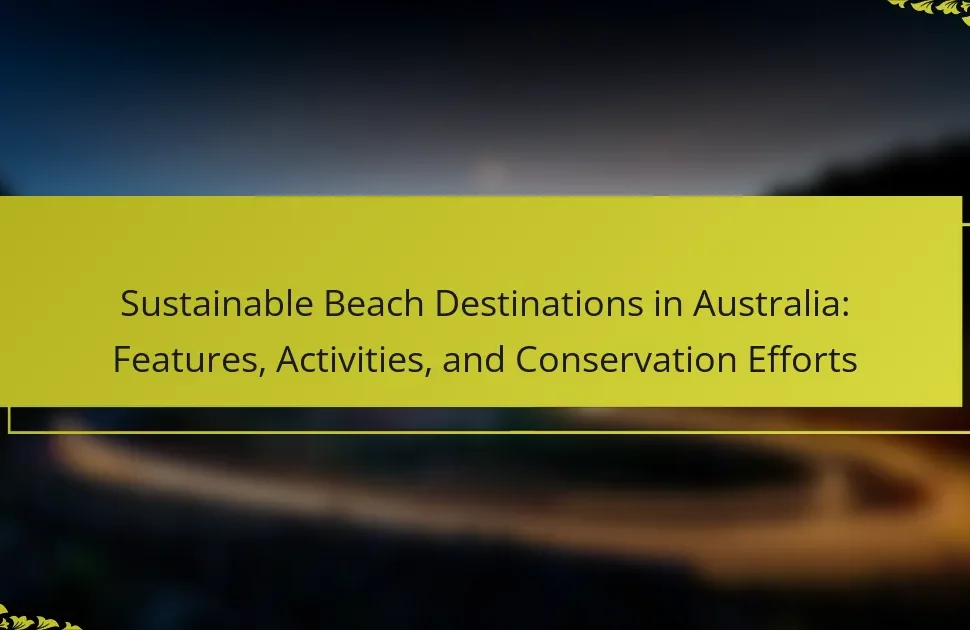Eco-friendly accommodations in Costa Rica offer significant benefits, including conservation of natural resources and support for local ecosystems. Explore various types, such as eco-lodges and treehouses, in popular locations like Manuel Antonio, Monteverde, and the Osa Peninsula. Discover how these options promote sustainability while providing unique travel experiences. Learn how to choose authentic eco-friendly stays that enhance community development and minimize ecological footprints.
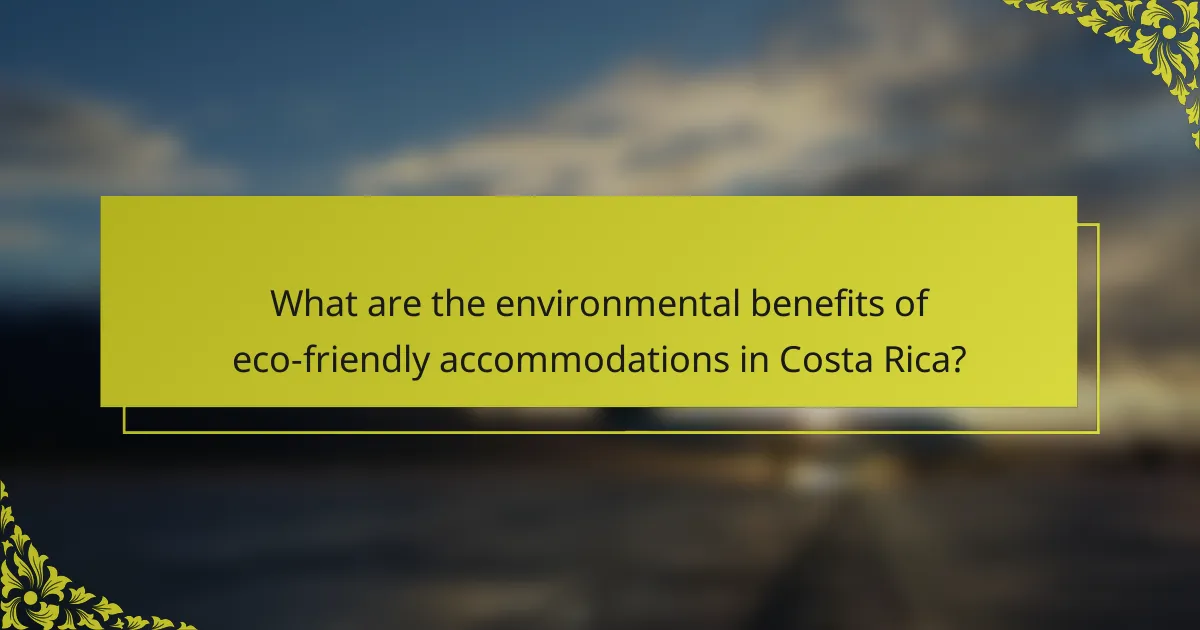
What are the environmental benefits of eco-friendly accommodations in Costa Rica?
Eco-friendly accommodations in Costa Rica provide significant environmental benefits, including conservation of natural resources, reduction of carbon footprints, and support for local ecosystems. These establishments often utilize renewable energy sources, such as solar power, and implement water-saving technologies. Furthermore, they promote biodiversity by preserving habitats and supporting sustainable tourism practices. By choosing eco-friendly options, travelers contribute to the protection of Costa Rica’s rich biodiversity and help mitigate climate change impacts.
How do eco-friendly accommodations contribute to local biodiversity?
Eco-friendly accommodations contribute to local biodiversity by promoting sustainable practices that protect ecosystems. These lodgings often implement conservation initiatives, such as reforestation and wildlife protection, which enhance habitat quality. Additionally, they educate guests about local flora and fauna, fostering awareness and appreciation. As a result, eco-friendly accommodations play a vital role in preserving Costa Rica’s rich biodiversity.
What role do renewable energy sources play in these accommodations?
Renewable energy sources significantly enhance eco-friendly accommodations in Costa Rica by reducing carbon footprints. These accommodations often utilize solar panels, wind turbines, and bioenergy systems to power facilities sustainably. For instance, solar energy can cover up to 100% of energy needs in some lodges, promoting energy independence and environmental conservation. Additionally, the integration of renewable energy supports local economies by creating jobs in green technology and maintenance.
Why is water conservation important in eco-friendly lodging?
Water conservation is crucial in eco-friendly lodging because it reduces environmental impact and promotes sustainability. In Costa Rica, where water resources can be limited, conserving water helps protect local ecosystems. Eco-friendly accommodations often implement practices like rainwater harvesting and low-flow fixtures, which enhance resource efficiency. This commitment not only supports biodiversity but also attracts environmentally conscious travelers. By prioritizing water conservation, these lodgings contribute to a healthier planet and ensure their operations remain sustainable in the long term.

Which types of eco-friendly accommodations are popular in Costa Rica?
Eco-friendly accommodations in Costa Rica include eco-lodges, treehouses, and boutique hotels. These types prioritize sustainability, offering unique experiences while minimizing environmental impact. Popular options often feature renewable energy sources, organic gardens, and locally sourced materials. Notable locations include Monteverde, Manuel Antonio, and Osa Peninsula.
What are the key features of eco-lodges?
Eco-lodges feature sustainable design, natural materials, and low environmental impact. They often utilize renewable energy sources, promote local culture, and provide eco-friendly amenities. Key features include unique architecture, integration with nature, and educational experiences about conservation. Eco-lodges may also offer organic food options and support local communities through employment and sourcing.
How do boutique hotels differ in their eco-friendly practices?
Boutique hotels often implement unique eco-friendly practices that set them apart from traditional accommodations. They typically focus on sustainable design, utilizing local materials and energy-efficient systems. Many boutique hotels prioritize organic and locally sourced food, reducing their carbon footprint. Additionally, they may offer personalized guest experiences that promote environmental awareness, such as guided eco-tours or workshops on local conservation efforts. This commitment to sustainability enhances their appeal to environmentally conscious travelers.
What unique experiences do treehouses offer?
Treehouses offer immersive nature experiences, combining comfort with environmental awareness. Guests enjoy unique perspectives of the surrounding landscape, fostering a deeper connection with nature. Treehouses promote sustainability by using eco-friendly materials and minimizing environmental impact. Their elevated design provides a sense of adventure and tranquility, attracting those seeking a distinctive getaway in Costa Rica’s lush environments.
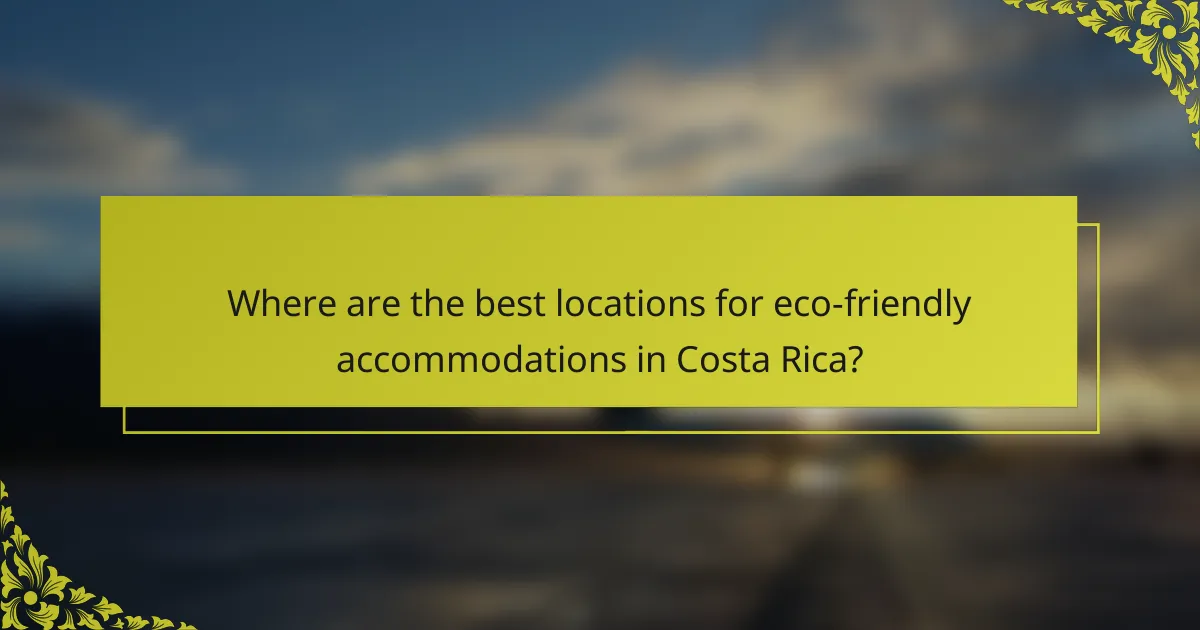
Where are the best locations for eco-friendly accommodations in Costa Rica?
The best locations for eco-friendly accommodations in Costa Rica include Manuel Antonio, Monteverde, and the Osa Peninsula. These areas offer a variety of sustainable lodging options that prioritize environmental conservation and community support.
Manuel Antonio features eco-lodges surrounded by lush rainforests and stunning beaches. Monteverde is known for its cloud forests, providing unique accommodations that promote biodiversity. The Osa Peninsula, with its remote beauty, hosts eco-friendly resorts focused on wildlife preservation and sustainable tourism practices.
Travelers can enjoy activities like hiking, birdwatching, and exploring local culture while minimizing their ecological footprint.
Which regions are known for sustainable tourism initiatives?
Costa Rica is renowned for its sustainable tourism initiatives, particularly in eco-friendly accommodations. These initiatives are focused on minimizing environmental impact while providing unique experiences. Popular types include eco-lodges, treehouses, and sustainable hotels, often located in biodiversity hotspots like Monteverde and the Osa Peninsula. The benefits of these accommodations include conservation efforts, support for local communities, and enhanced guest experiences through nature immersion.
What are the most popular eco-friendly hotels in coastal areas?
Costa Rica features several popular eco-friendly hotels along its stunning coastlines. These accommodations prioritize sustainability while offering unique experiences. Notable examples include Lapa Rios Lodge, known for its biodiversity, and The Harmony Hotel, which emphasizes wellness and renewable energy. Other options include Playa Nicuesa Rainforest Lodge, nestled in a private reserve, and Hotel Belmar, recognized for its organic practices. Each of these hotels provides a unique blend of comfort and environmental responsibility, making them top choices for eco-conscious travelers.
How do mountain lodges promote eco-sustainability?
Mountain lodges promote eco-sustainability by integrating green practices into their operations. They utilize renewable energy sources, such as solar and wind, to reduce carbon footprints. Many lodges focus on sustainable building materials and designs that blend with the natural environment. They often implement water conservation measures, including rainwater harvesting and low-flow fixtures. Additionally, these lodges may support local economies by sourcing food and services from nearby communities, enhancing both sustainability and cultural experiences.

How can travelers ensure they choose authentic eco-friendly accommodations?
Travelers can ensure they choose authentic eco-friendly accommodations by researching certifications, reading reviews, and verifying sustainability practices. Look for properties with recognized eco-labels like the Rainforest Alliance or Green Key. Additionally, consider the location’s commitment to local conservation efforts, which enhances the authenticity of the experience. Engaging with local communities and supporting businesses that prioritize environmental stewardship further ensures a genuine eco-friendly stay.
What certifications should travelers look for?
Travelers should look for certifications like Green Globe, EarthCheck, and the Costa Rican Certification for Sustainable Tourism. These certifications indicate eco-friendly practices and commitment to sustainability in accommodations.
How can reviews and testimonials guide eco-friendly lodging choices?
Reviews and testimonials significantly influence eco-friendly lodging choices by providing authentic insights from previous guests. They highlight the unique attributes of accommodations, such as sustainable practices and community involvement, which resonate with eco-conscious travelers. Positive feedback often emphasizes the benefits of eco-friendly features, like energy efficiency and local sourcing. Additionally, testimonials can guide potential visitors to specific locations in Costa Rica known for their commitment to sustainability, enhancing the overall travel experience.
Which questions should travelers ask before booking?
Travelers should ask about sustainability practices, certifications, location, amenities, and community impact before booking eco-friendly accommodations. Understanding these aspects ensures a responsible and enjoyable stay. Additionally, inquire about the types of eco-friendly initiatives implemented, such as waste management and energy conservation.
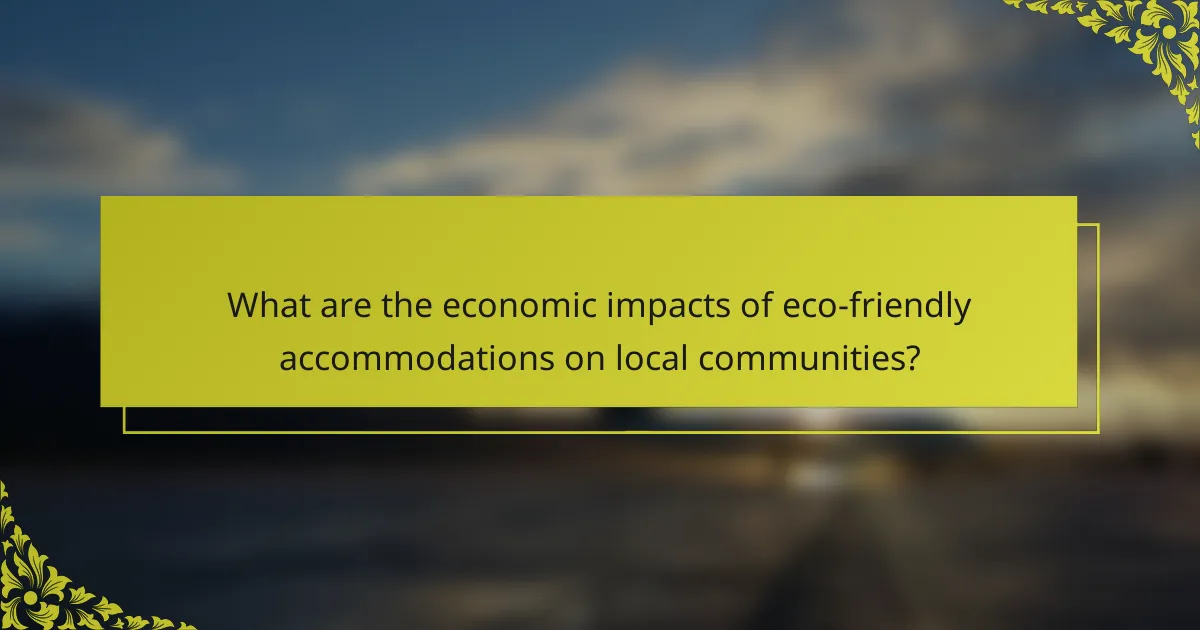
What are the economic impacts of eco-friendly accommodations on local communities?
Eco-friendly accommodations positively impact local communities by boosting the economy, creating jobs, and promoting sustainable tourism. These establishments often source materials locally, fostering economic growth. Additionally, they attract environmentally conscious travelers, increasing visitor numbers. This influx generates revenue for local businesses, enhancing community development.
How do these accommodations support local employment?
Eco-friendly accommodations in Costa Rica significantly support local employment by prioritizing local hiring and sourcing. These establishments often employ local residents, providing jobs in hospitality, maintenance, and tour services. As a result, they boost the local economy and promote sustainable tourism practices. Additionally, many eco-friendly accommodations collaborate with local artisans and farmers, further enhancing job opportunities and community engagement. This approach fosters a sense of ownership and pride among residents, contributing to the preservation of cultural heritage and environmental conservation.
What is the significance of community engagement in eco-tourism?
Community engagement is crucial in eco-tourism as it fosters sustainable practices and enhances local economies. By involving local residents, eco-tourism ensures that the benefits of tourism are shared, promoting environmental conservation and cultural preservation. Engaged communities are more likely to protect their natural resources, leading to better eco-friendly accommodations in Costa Rica. This collaboration can result in unique eco-friendly lodging options, such as locally-owned lodges that reflect the region’s culture and values. Additionally, community involvement can enhance visitor experiences through authentic interactions and educational opportunities about local ecosystems.
How do eco-friendly practices influence local economies?
Eco-friendly practices significantly boost local economies by attracting sustainable tourism and supporting local businesses. In Costa Rica, eco-friendly accommodations promote conservation efforts and provide jobs, enhancing community welfare. They also encourage local sourcing of goods, which stimulates the economy. Additionally, these practices can lead to increased investment in green technologies, further benefiting local communities.
What are the common challenges faced by eco-friendly accommodations?
Eco-friendly accommodations face several challenges that can impact their sustainability and guest experience. Limited access to renewable resources often hinders energy efficiency. High initial costs for sustainable materials and technologies can deter investment. Additionally, educating staff and guests about eco-friendly practices remains a significant hurdle. Balancing profitability with environmental responsibility poses ongoing difficulties for many operators. Lastly, competition from conventional hotels can overshadow the unique offerings of eco-friendly options.
How can these challenges be overcome?
Eco-friendly accommodations in Costa Rica can overcome challenges through community engagement, sustainable practices, and support from local governments. Collaborating with local communities fosters awareness and promotes sustainable tourism. Implementing energy-efficient technologies reduces operational costs and environmental impact. Government incentives for green initiatives encourage more businesses to adopt eco-friendly practices.

What are the best practices for maintaining eco-friendly accommodations?
To maintain eco-friendly accommodations, focus on sustainable practices that minimize environmental impact. Prioritize energy efficiency, waste reduction, and the use of renewable resources. Implementing recycling programs, utilizing solar energy, and sourcing local materials enhance sustainability. Regularly train staff on eco-friendly practices to ensure consistent application.
Which sustainable materials are recommended for construction?
Sustainable materials recommended for construction include bamboo, reclaimed wood, recycled metal, and straw bales. These materials offer durability, energy efficiency, and reduced environmental impact. For example, bamboo grows rapidly and sequesters carbon effectively, making it an excellent eco-friendly choice.
How can waste management be optimized in eco-friendly settings?
Waste management in eco-friendly settings can be optimized through sustainable practices. Implementing recycling programs, composting organic waste, and using biodegradable materials greatly reduce landfill contributions. Additionally, educating guests on responsible waste disposal fosters a culture of sustainability. Eco-friendly accommodations in Costa Rica often incorporate these strategies, enhancing both environmental impact and guest experience.
What innovative technologies can enhance sustainability?
Innovative technologies enhancing sustainability in eco-friendly accommodations include solar energy systems, rainwater harvesting, and smart energy management systems. These technologies reduce environmental impact and improve resource efficiency. For example, solar panels can significantly decrease reliance on fossil fuels, while rainwater harvesting systems can conserve water. Smart energy management systems optimize energy use, leading to lower costs and reduced emissions.
What are common mistakes to avoid when promoting eco-friendly accommodations?
To effectively promote eco-friendly accommodations, avoid common mistakes like focusing solely on price, neglecting sustainability certifications, or failing to highlight unique local experiences. Emphasize authentic eco-friendly practices, such as renewable energy use and community involvement. Ensure your marketing materials reflect the accommodations’ unique attributes, like their location in Costa Rica’s biodiversity hotspots, enhancing their appeal.
